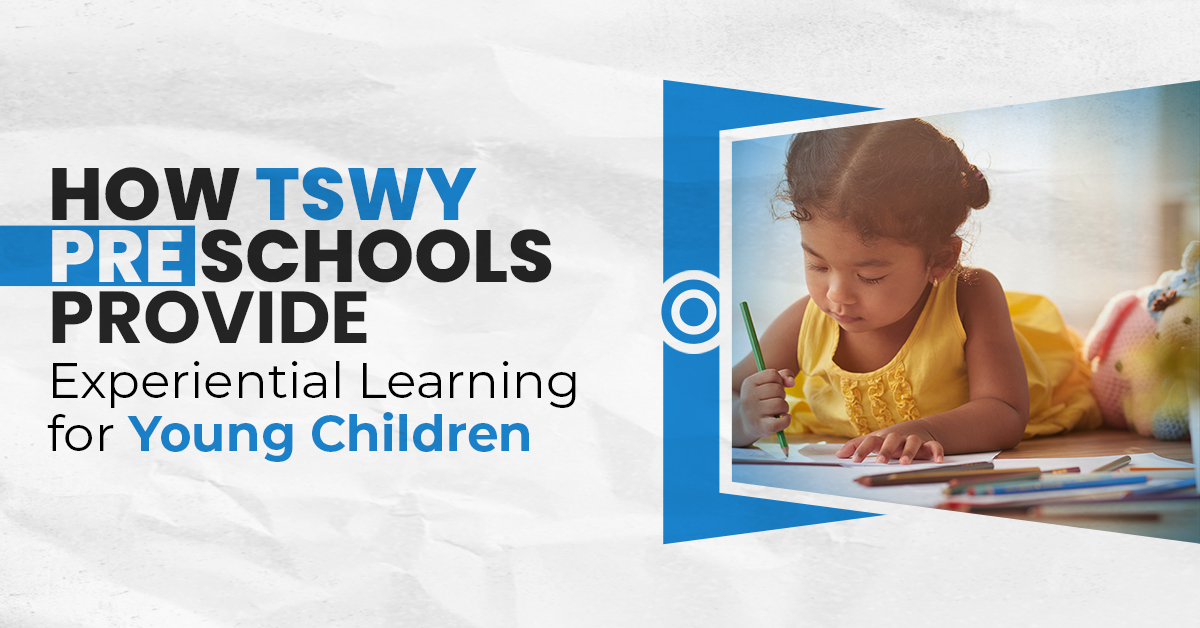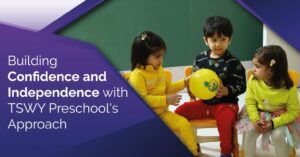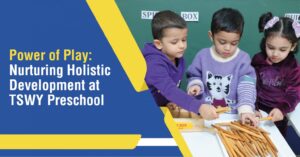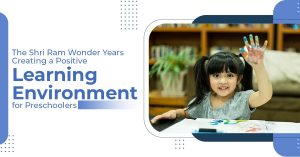Experiential learning is a teaching method that focuses on learning by doing. It is a highly effective way for young children to learn, as it allows them to explore and discover new concepts at their own pace. TSWY Preschools understand the importance of experiential learning for young children, and they provide a variety of opportunities for young children to learn through hands-on activities and real-world experiences.
What is Experiential Learning?
Experiential learning is a theory of learning and education that emphasizes the importance of doing. It is based on the idea that people learn best by experiencing things firsthand. Experiential learning is often contrasted with traditional forms of education, which focus on learning through lectures and textbooks.
Why is Experiential Learning Important for Young Children?
Experiential learning is important for young children for a number of reasons. First, it allows them to learn at their own pace. Children can explore and discover new concepts at a rate that is comfortable for them. Second, experiential learning is highly engaging and motivating for young children. Children are more likely to be interested in learning when they are actively involved in the process. Third, experiential learning helps children to develop important skills such as problem-solving, critical thinking, and creativity.
How do TSWY Preschools Provide Experiential Learning?
TSWY Preschools provide experiential learning in a variety of ways. Here are a few examples:
- Hands-on Activities
TSWY Preschools offer a variety of hands-on activities that allow children to learn through doing. For example, children might plant seeds in a garden, build a birdhouse, or cook a simple meal.
- Real-World Experiences
TSWY Preschools also provide children with opportunities to learn through real-world experiences. For example, children might visit a local farm, museum, or fire station.
- Play-Based Learning
TSWY Preschools believe that play is an essential part of learning. They provide children with a variety of opportunities to play, both indoors and outdoors. Play allows children to explore, experiment, and learn at their own pace.
Benefits of Experiential Learning for Young Children
Experiential learning has many benefits for young children. Here are a few examples:
- Improved Learning Outcomes
Research has shown that experiential learning can lead to improved learning outcomes for young children. Children who learn through experiential activities are more likely to remember what they learn and to apply it to new situations.
- Increased Engagement and Motivation
Experiential learning is highly engaging and motivating for young children. Children are more likely to be interested in learning when they are actively involved in the process.
- Development of Important Skills
Experiential learning helps children to develop important skills such as problem-solving, critical thinking, and creativity. Children also learn how to work together as a team and to communicate effectively.
- Increased Confidence and Self-Esteem
When children successfully complete an experiential activity, they feel a sense of accomplishment and pride. This can lead to increased confidence and self-esteem.
- Love of Learning
Experiential learning can help children to develop a love of learning. Children who learn through hands-on activities and real-world experiences are more likely to be excited about learning new things.
Conclusion
TSWY Preschools believe that experiential learning is the best way for young children to learn. They provide a variety of opportunities for children to learn through hands-on activities, real-world experiences, and play. Experiential learning has many benefits for young children, including improved learning outcomes, increased engagement and motivation, development of important skills, increased confidence and self-esteem, and a love of learning.
Additional Thoughts on How TSWY Preschools Provide Experiential Learning
TSWY Preschools create a supportive and inclusive environment for experiential learning by:
- Creating a Safe and Welcoming Space
TSWY Preschools create a safe and welcoming space where children feel comfortable exploring and learning. Teachers are supportive and encouraging, and they help children to feel confident in their abilities.
- Providing Children with Choices
TSWY Preschools give children choices about what they want to learn and how they want to learn it. This allows children to take ownership of their learning and to learn at their own pace.
- Differentiating Instruction
TSWY Preschools differentiate instruction to meet the needs of all learners. Teachers provide children with different levels of support and challenge, depending on their individual needs.
- Encouraging Collaboration
TSWY Preschools encourage children to collaborate with each other. This helps children to develop important skills such as problem-solving, communication, and teamwork.
- Celebrating Diversity
TSWY Preschools celebrate diversity and inclusion. They provide children with opportunities to learn about different cultures and perspectives.
Specific Examples of How TSWY Preschools Create a Supportive and Inclusive Environment
Teachers provide children with a variety of materials and resources to choose from. This allows children to explore their interests and to learn at their own pace.
Teachers create learning centers in the classroom where children can participate in different activities. This allows children to learn at their own pace and to choose the activities that they are most interested in.
Teachers provide children with opportunities to work together on projects and activities. This helps children to develop important skills such as problem-solving, communication, and teamwork.
Teachers celebrate children’s unique cultures and perspectives. They might read stories from different cultures, celebrate holidays from around the world, or invite guest speakers from the community.
TSWY Preschools’ Commitment to Experiential Learning
TSWY Preschools are committed to providing children with a high-quality education that is based on experiential learning. They create a supportive and inclusive environment where children feel comfortable exploring and learning.





